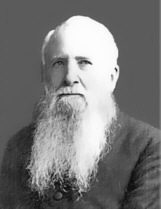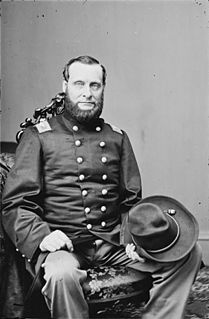
Milton Lorenzo Haney was a regimental chaplain in the United States Army.

Jacob Wilson Parrott was an American soldier and carpenter. He was the first recipient of the Medal of Honor, a new military award first presented by the United States Department of War to six Union Army soldiers who participated in the Great Locomotive Chase in 1862 during the American Civil War (1861–1865).

The 104th Ohio Infantry Regiment, sometimes 104th Ohio Volunteer Infantry was an infantry regiment in the Union army during the American Civil War. It played a conspicuous role at the Battle of Franklin during the 1864 Franklin-Nashville Campaign, where six members later received the Medal of Honor, most for capturing enemy flags.
The 21st Ohio Infantry Regiment was an infantry regiment in the Union Army during the American Civil War. Mostly an all-volunteer unit, with the exception of a few draftees, the 21st Ohio served for both ninety-day and three-year enlistments and fought exclusively in the Western Theater. It saw action in some of the war's bloodiest battles including Stones River, Chickamauga, the Atlanta Campaign, and Sherman's March to the Sea.

The 51st Indiana Infantry Regiment was an infantry regiment that served in the Union Army during the American Civil War.

John Samuel Darrough was a Union Army soldier in the American Civil War and a recipient of the United States military's highest decoration, the Medal of Honor, for his actions during a skirmish near Eastport, Mississippi. Born in Kentucky, Darrough moved to Illinois as a child and enlisted in the Union Army from that state. While participating in a mission to destroy a Confederate railway, Darrough and others were stranded on the shore of the Tennessee River under intense enemy fire. Although he had found a canoe with which to cross the river safely, he voluntarily returned to the Confederate-held shore to rescue a fellow soldier who was in danger of drowning.

Clinton Lycurgus Armstrong was a Union Army soldier during the American Civil War. He received the Medal of Honor for gallantry during the Siege of Vicksburg on May 22, 1863.

Thomas A. Blasdel was a Union Army soldier during the American Civil War. He received the Medal of Honor for gallantry during the 1863 Siege of Vicksburg. Blasdel enlisted in the Union army at 19 years old in August, 1862, during the Civil War. He went on to get promoted to Private, and from there to Corporal.

Emmer Bowen was a Union Army soldier during the American Civil War. He received the Medal of Honor for gallantry during the Siege of Vicksburg on May 22, 1863.

John Wesley Conaway was a Union Army soldier during the American Civil War. He received the Medal of Honor for gallantry during the Siege of Vicksburg on May 22, 1863.

Joseph Frantz was a Union Army soldier during the American Civil War. He received the Medal of Honor for gallantry during the Siege of Vicksburg on May 22, 1863.
The 83rd Indiana Infantry Regiment, sometimes called 83rd Indiana Volunteer Infantry Regiment, was an infantry regiment that served in the Union Army during the American Civil War.

William W. Chisman (1843–1925) was a Union Army soldier during the American Civil War who received the Medal of Honor for gallantry during the Siege of Vicksburg on May 22, 1863.

David Frakes Day was a Union Army soldier during the American Civil War, and later a newspaper publisher. He received the Medal of Honor for gallantry during the Siege of Vicksburg on May 22, 1863.

David H. Helms was a Union Army soldier during the American Civil War. He received the Medal of Honor for gallantry during the Siege of Vicksburg on May 22, 1863.

Wilson Wright Brown was a soldier and recipient of the Medal of Honor for his role in the Great Locomotive Chase during the American Civil War.

Sergeant William Bumgarner was an American soldier who fought in the American Civil War. Bumgarner received the country's highest award for bravery during combat, the Medal of Honor, for his action at Vicksburg, Mississippi on 22 May 1863. He was honored with the award on 10 July 1894.

The 148th Regiment Pennsylvania Volunteer Infantry was an infantry regiment that served in the Union Army during the American Civil War.
Jonathan C. Kirk was a Union Army soldier in the American Civil War who received the U.S. military's highest decoration, the Medal of Honor.

Henry C. Slusher was a private in the United States Army who was awarded the Medal of Honor for actions performed on 11 September 1863 at Moorefield, West Virginia.













